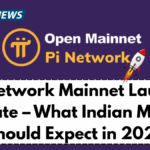After years of anticipation, the Pi Network Mainnet has officially gone live in India as of June 2025. The launch marks a pivotal shift in how digital currencies are perceived and used by Indian users. With over 4 million Indian pioneers involved, the Pi Network has built a strong grassroots foundation in the country. Now, with the mainnet live, utility is finally being unlocked, and expectations are sky-high.
The mainnet activation means Indian users can begin actual transactions using Pi coins. They’re no longer limited to mining or virtual simulations; real-world use is finally possible. This shift brings Pi Network closer to becoming a decentralized financial ecosystem, especially for India’s mobile-first economy.

How Indian Users Can Access the Pi Mainnet
Accessing the Pi mainnet in India requires completing KYC (Know Your Customer) verification. Users must ensure their identity is verified through the Pi Browser or authorized partners. Once verified, their mined Pi will be migrated to the mainnet wallet. This process is crucial as unverified accounts will not see any mainnet balance.
Indian pioneers should also be aware of wallet configuration. Mainnet wallets must be synced with the Pi Browser and set up with a secure passphrase. Without this step, users risk losing access to their coins permanently. Awareness campaigns are running across Indian social media channels to help users avoid missteps.
Pi Network Launch India: Economic Impacts and Opportunities
With India’s digital payments market projected to cross $400 billion by 2026, Pi’s entry into the transactional ecosystem is well-timed. For small businesses and freelancers, especially in Tier 2 and Tier 3 cities, Pi offers a low-fee, accessible alternative to traditional banking.
Local marketplaces are already testing Pi payment integrations. Some educational platforms are also exploring Pi as a payment method for micro-courses. These innovations could redefine financial inclusion across rural India. Additionally, developers and crypto startups are leveraging Pi’s SDK to create apps within the Pi ecosystem, targeting Indian users.
Key Details Indian Users Need to Know
| Feature | Description |
|---|---|
| Launch Date | June 2025 |
| KYC Requirement | Mandatory for wallet migration |
| Pi Wallet Setup | Required via Pi Browser with passphrase |
| Usable Pi | Only after KYC and migration completion |
| Use Cases in India | Payments, e-commerce, micro-courses, services |
| Developer Tools | Pi SDK and API available for app integration |
Common Concerns: Legality and Regulations in India
While India has taken a cautious approach to cryptocurrency regulation, the Pi Network falls in a unique category. Since Pi is not yet tradable on external exchanges and operates in a closed-loop ecosystem, it avoids some of the regulatory pitfalls associated with tokens like Bitcoin or Ethereum.
Still, users should be vigilant. The Reserve Bank of India (RBI) has not made formal statements on Pi, but crypto taxation laws enacted in 2022 still apply. Indian users may need to declare Pi-related income if utility transactions are monetized. Legal experts suggest keeping records of all transactions until clearer guidelines are issued.
Final Thoughts: What Lies Ahead for Pi in India
The Pi Network launch in India is more than just a technical milestone—it’s a step toward redefining digital access and value exchange. For Indian pioneers who’ve supported the project from the beginning, June 2025 is a vindication of their patience.
If the ecosystem scales as expected, Pi could become a widely accepted alternative digital currency in India. From education to commerce, the use cases are vast. However, users must remain informed, secure their assets, and participate actively to maximize benefits.
FAQs
What is the Pi Network launch India date?
The Pi Network officially launched its mainnet in India in June 2025.
Is KYC mandatory for Indian users?
Yes, KYC is essential for mainnet migration and accessing your mined Pi coins.
Can I trade Pi coins in India?
Currently, Pi is in a closed mainnet phase. Trading is not yet allowed on public exchanges.
What are the benefits for Indian users?
Low-fee transactions, potential for app-based payments, and increased financial inclusion, especially in underserved areas.
Is Pi Network legal in India?
While not banned, it remains in a regulatory gray zone. Users should track legal developments closely.
For More Information Click Here



